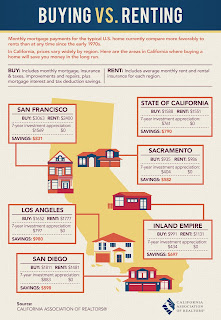 About 25% of buyers, especially first time buyers, are reporting in a recent survey by HSH.com that they are having trouble with accumulating funds for mortgage down payment. Another 25% say the price of the housing market is slowing them down, keeping them from buying.
About 25% of buyers, especially first time buyers, are reporting in a recent survey by HSH.com that they are having trouble with accumulating funds for mortgage down payment. Another 25% say the price of the housing market is slowing them down, keeping them from buying. The actual breakdown as to the biggest hurdles to home ownership in this survey where the respondents were given these choices: here is how they responded:
- Credit score: 12.8 percent
- Home prices: 23.5 percent
- Property taxes: 7.3 percent
- Down payment: 22.9 percent
- Interest rates: 12.6 percent
- No issues: 20.9 percent
What is often not in the minds of people is how they can eliminate some problems with saving money for down payment if they're willing to eliminate expenses in their lifestyle. This may be unthinkable, but yes, it should be done. Why should a very well-off national/international coffee franchise be continually supported by you when it is not returning the favor by contributing to your down payment? The point being that the daily disappearance of a few dollars is not thought of on an annual scale, but it makes a difference. For instance, Chipotle is a place I love for lunch. Even if I just buy my favorite steak bowl there, with no drinks or chips, it's now $8.07 including tax because they just had another price increase. Let's say I go there 5 times a week: $40.35 x 4 = $161.40 month x 12 = $1936.80 a year! Just do that same calculation with your favorite lunch place and see what it adds up to. You can do the same with weekend food, breakfast restaurants, or whatever. I love to select restaurant/dining out food as an item for economizing, because there's more opportunity to control it by eating at home more often.
If you are approved to buy a $450,000 home, your FHA downpayment will be at the rate of 3.5% (plus upfront MIP costs which can be folded into your loan amount). That's $15,750 for the down payment. Could you get there faster by figuring out where to economize? This is the part where you priorities get prioritized if you want to buy. Gas prices and student loan payments are non-negotiable areas, but there are many personal choices which can be changed and deposited into an interest-bearing account for the future!








